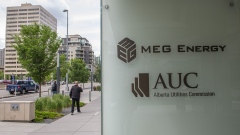Jan 10, 2024
Dan Osborn Was Fired for Watching Netflix at Work. Now He’s Running for Senate.
, Bloomberg News
(Bloomberg) -- Dan Osborn, a 48-year-old labor-leader-turned-political-novice, is running as an independent against two-term incumbent Nebraska Republican Senator Deb Fischer. Third-party races are always long shots and this one is no different: While Osborn had raised $158,000 by the end of 2023, according to his campaign, that’s only a fraction of the $4 million that Fischer has, according to OpenSecrets. Still, one November poll found him leading Fischer 40% to 38% — despite 59% of voters having never heard of him. There are no announced Democratic challengers.
Before jumping into the senatorial race, Osborn was a union leader at Kellogg Co. who helped organize a 1,400-worker strike across multiple cereal plants in 2021. (Kellogg has since split into two companies: Kellanova and WK Kellogg Co.) With support from President Joe Biden and Nebraska’s other Republican Senator Pete Ricketts, who was the state's governor at the time, the strike ended with raises and improved benefits.
The formerly registered Democrat is now running as an independent favoring abortion rights, legalized medical marijuana and Second Amendment protections. Work Shift spoke to him about why he left his job as an industrial mechanic at Kellogg in March, making the switch into politics, and what he hopes to achieve with his run — besides winning, of course.
This interview has been edited and condensed.
Why did you leave Kellogg?
It is my belief — and I have the burden of proof, obviously — that I was fired for being union president.
I was terminated for having Netflix history on my work computer. Monday through Friday, I would work as a maintenance planner because I knew those machines better than anybody in that building. Part of my role was to run the computer programs and talk to vendors, make sure we're ordering the right parts for rebuilds and scheduled maintenance downtimes and things like that. I had three computer screens, and on my third screen I would usually have a comedy concert on as I ran my reports. Everybody in the planning department knew that, but it was never an issue. But somebody apparently turned it in to HR and it actually stuck. (WK Kellogg does not comment on personnel matters, a spokesperson told Bloomberg.)
So why run for office?
It kind of goes back to the strike, right? I was just good at it and I was thrust into that role. It wasn't solely my decision to go on strike, it was a collective decision, but I found myself really enjoying the work that I was doing. I wanted to continue that to make positive changes in people's lives.
Politics seems like a really rough job. Why do you want to get into something like that?
That's an excellent question. I still ask myself that. I have a very good ability to see both sides of the issues and find compromises. I understand fully the backstabbing and the struggle for power, and people will do almost anything seemingly to maintain that power.
What skills in particular would you bring to the table as a senator for Nebraska?
I would say it's the ability to bring people together from both sides of the aisle. I knew when we were on strike that Democrats would come out to the picket line without having to be asked or prompted. So I made it my mission to get Republicans out to the picket line. Congressman Don Bacon — I don't want to have to toot my horn here — but he came out there because I was relentless in making this issue nonpartisan. (A spokesperson for Congressman Bacon declined to comment.) I got Republican Pete Ricketts, who's now in the United States Senate, to draft a letter to [Kellogg’s then-Chief Executive Officer] Steve Cahillane. I went out to Nebraska's capital twice to accomplish that. (“Then-Governor Ricketts sent the letter because it was the right thing to do for Nebraska," said Ian Swanson, spokesperson for Senator Ricketts. "Continuing the negotiations was in the best interest of Kellogg, the workers, and the state. Claims any individual led to his decision would be inaccurate.”)
What’s the first thing you would do after becoming a US senator?
The first thing I want to do is make it easier for the everyday average worker to be able to unionize and to hold these companies accountable when they do anti-union activity.
This should be a nonpartisan issue because it is about working families. To me, being in a union meant I could afford to be a homeowner, to own cars, to put money aside for my kids' college funds, to have nice Christmases. That kind of sounds a little bit like the American dream.
Gallup recently had a poll that showed 63% of US adults agreed that a third major party is needed, but at the same time, third-party candidates don't have a long history of success in this country. So what are you hoping to achieve with your run?
Ultimately, I’m hoping to win. Not being beholden to special interests and monopolistic corporations, I feel like this will create a blueprint for others to follow into the future. We might not see it in our lifetime, but if we can create this blueprint, we can definitely start a trend for independents winning and hopefully being able to affect change more positively.
I'd say if we could get upwards of 44% of Nebraskans voting for me, it would show extreme viability for a third-party candidate to be set up for success in the future.
©2024 Bloomberg L.P.








